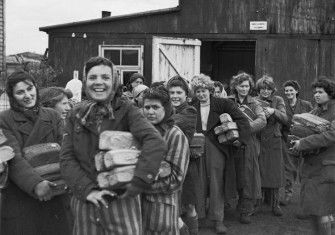Night Will Fall
After 70 years, a visual record of the liberation of Belsen has been restored.

When the British 11th Armoured Division liberated Bergen-Belsen concentration camp near Hanover in mid-April 1945, British Army Film Unit cameramen recorded images of bodies piled one on another and of the captured SS guards throwing the naked corpses into vast burial pits.
In London, the Psychological Warfare Division of the Supreme Headquarters Allied Expeditionary Force realised that this footage provided the most powerful record yet of Nazi war crimes. Sidney Bernstein, a film consultant at the Ministry of Information (who later founded Granada Television), produced a treatment, along with future Labour minister Richard Crossman, that would feature the footage from Belsen as well as other camps across Germany.
Bernstein invited Alfred Hitchcock to supervise the edit, though it is now clear that Hitchcock played little role in its production other than in suggesting transparency in the use of footage so no one could claim it was faked.
The film was never completed. The Americans pulled out of the collaboration and Billy Wilder produced their own film about the camps, Death Mills. The Foreign Office concluded there was no longer a need to demonstrate to Germans the guilt they shared; it was time to rebuild Germany against a possible Soviet threat.
In 1952 five reels of ‘rough cut’ were deposited at the Imperial War Museum (IWM). This has now been restored as a film, unpromisingly titled German Concentration Camps Factual Survey. The IWM team led by Toby Haggith had to complete, from the production notes, a sixth reel that was never cut, using mostly Soviet footage of Auschwitz. They have recorded the commentary that they believe Crossman wrote.
The result, says Haggith, is a ‘lost masterpiece of British documentary film-making’. It includes a fascinating sequence about the recovery of some of the women in the camp, who are given new clothes to wear. Such remarkable images provide a rare moment of hope and the film ends on a universalist message claiming that: ‘Unless the world learns the lessons these pictures teach, night will fall.’
The IWM has decided to restrict screenings, only allowing the film to be shown where it can be introduced by a member of the IWM team. Clearly this limits the potential audience.
This is partly where a new documentary, Night Will Fall, directed by André Singer, comes in. It includes interviews with some of those who liberated Bergen-Belsen and with the cameramen who shot the footage. David Dimbleby describes the initial BBC disbelief at his father Richard’s radio broadcast from the liberated camp. Bernstein features from a 1984 interview and even Hitchcock appears in a 1962 audio interview, although the film speculates that the master of suspense never even visited the cutting room. Also appearing are several survivors, inlcuding Anita Lasker-Wallfisch, who had played in the camp orchestra at Auschwitz.
These are important films. It is fascinating to see how the horror of the camps might have been presented by a team of skilled British film-makers in 1945. Night Will Fall puts this original project into its historical context and brings it alive with thought-provoking testimony. It is vital that we look at these records of crimes committed just two generations ago.
Taylor Downing is the author of The World at War (BFI Palgrave Macmillan 2012).





